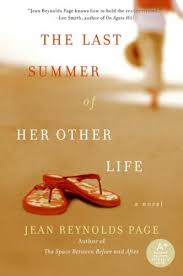 Yet another book about family secrets - I am on a roll with selecting my favorite types of books. This book focuses on Jules, a thirty-nine year old woman who finds out she is pregnant shortly before returning home to North Carolina to care for her dying mother. I must note: there is something about parenting in the wake of the loss of a parent that seems to beguile me. Individuals today have children later in life thereby increasing the likelihood that they will parent without the hands on guidance of their own parents. And yet the idea of parenting as an orphan still seems unnatural. I suppose in modern society the sandwich generation is expanding and thus parenting both parents and children is becoming the norm.
Yet another book about family secrets - I am on a roll with selecting my favorite types of books. This book focuses on Jules, a thirty-nine year old woman who finds out she is pregnant shortly before returning home to North Carolina to care for her dying mother. I must note: there is something about parenting in the wake of the loss of a parent that seems to beguile me. Individuals today have children later in life thereby increasing the likelihood that they will parent without the hands on guidance of their own parents. And yet the idea of parenting as an orphan still seems unnatural. I suppose in modern society the sandwich generation is expanding and thus parenting both parents and children is becoming the norm.Back to the book: Jules, is a sound operator, an LA woman, a protected daughter. And while she is thirty-nine she is still not fully grown. She has been protected by her mother and brother and even her high school boyfriend and doesn't know the truth about her father and his death. Furthermore, although she has a steady job and pays taxes, Jules recognizes that she has not truly emerged from adolescence as evidenced by the fact that she has chosen to live in Los Angeles - a city where individuals who do not want to grow up reside.
In North Carolina, Jules is forced to confront some very adult realities, and she emerges a stronger individual. Her life is dramatically altered shortly after her mother's death, as a local teen accuses her of "inappropriate sexual conduct." It is fascinating to see the consequences of such accusations, especially since the reader knows Jules did not partake in any such activities with the accuser -- a boy she cannot even identify. Soon the story spins into a much more complicated tale - that of a boy who is clearly suffering. Jules, and her brother Lincoln become further involved as they seek out answers to try to help the young boy.
There are a lot of twists and turns in the book. At first it seems to set up a romance between Jules and her high school boyfriend, the son of a man who died in the same boating accident as her father. But Jules also seeks out the attention of Walt, the uncle of her accuser (a boy she crushed upon in high school) who is now married. And while Jules's status as an adopted child never seems to bring any drama to the story, the reveal of her brother's parentage leads to a great deal of anguish and discovery.
This book offers up a refreshing view on family and truly shows that motherhood has nothing to do with blood. And yet it also shows the absolute unraveling of more than one family due to the poor choices and questionable behavior of one individual. It is more of a mystery than one would expect from the cover. And all together it spins an engaging story that rivets the reader and raises a great deal of questions on a variety of topics.
My reading was further enriched by Reynolds Page's insights at the end of the novel. She writes: "I see my books as being completed in a new way each time someone reads one of them," and "I see writing books as a kind of collaboration with the reader." I love this idea and am going to spend some time further pondering these insights.
No comments:
Post a Comment